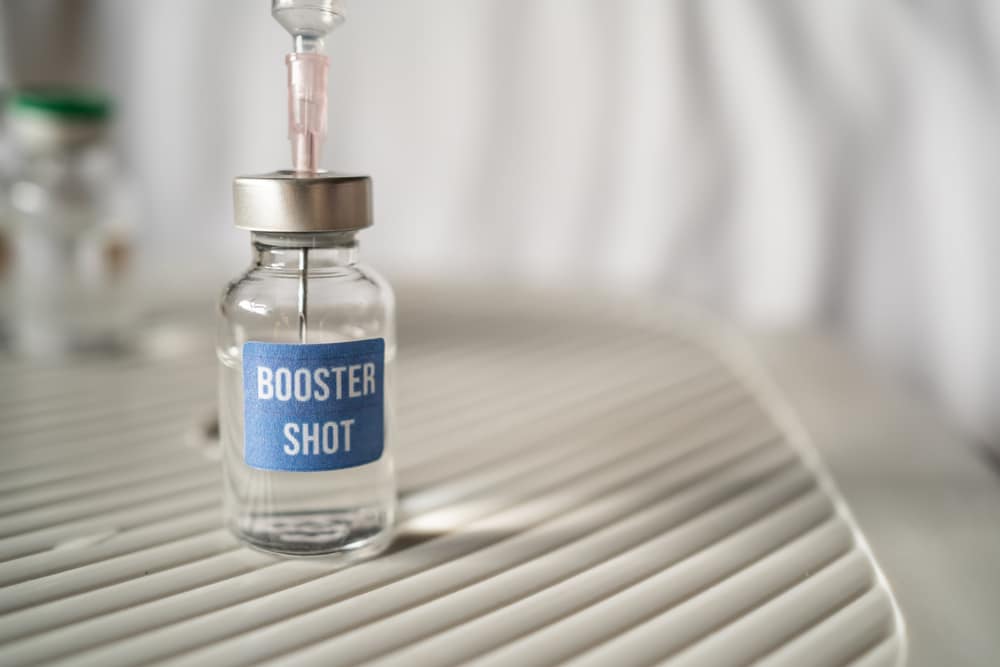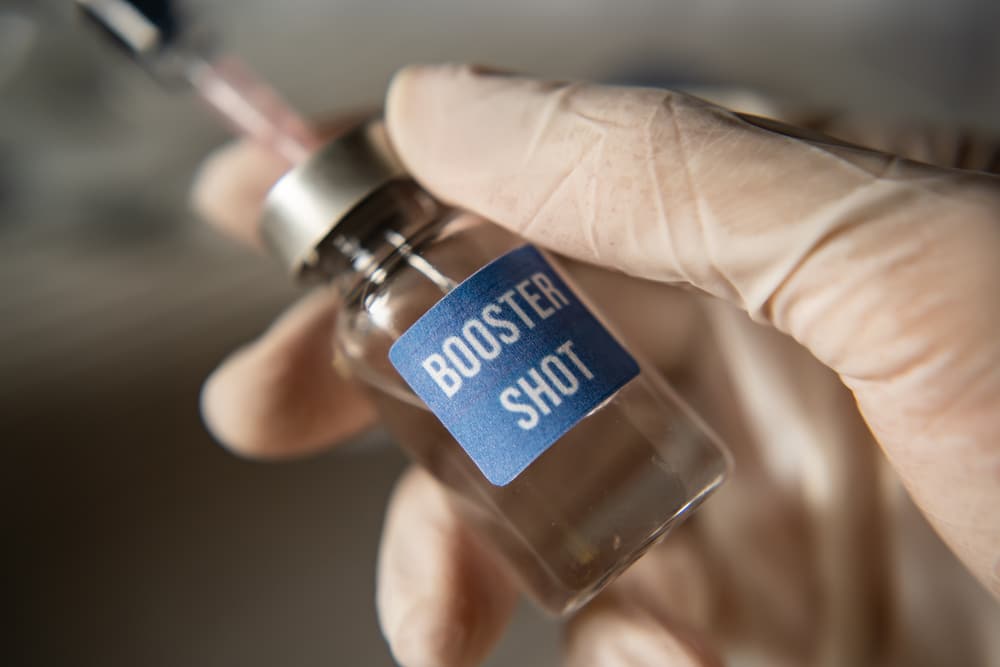Ever heard the term booster shots and wonder what it means? Has your vet given your dog booster shots, and you’ve wondered the same thing? You’re not alone, and you’re about to find out exactly what booster shots do for dogs.
Booster shots are shots veterinarians give after the first vaccine shot to stimulate the immune response. Veterinarians give annual boosters to refresh the memory of immune cells, strengthening immunity by giving it a boost. This increases the number of antibodies, also called titer, that enhances the ability of the immune system to neutralize specific illness- and disease-causing agents.
Table of Contents
- What Is The Immune System?
- White Blood Cells
- Types Of Immunity: Innate Vs Humoral Immunity
- How Do Vaccines Work?
- What Are The Core And Non-Core Vaccines Of Dogs?
- Why Are Boosters Important?
- How Boosters Improve The Immune System?
- How Often Should Dogs Get Booster Shots?
- What Factors Affect The Immune System Of Dogs?
- Conclusion: What Do Booster Shots Do For Dogs?
What Is The Immune System?
The immune system is the body’s defense mechanism that protects the body against foreign invaders like infectious agents, including bacteria, viruses, fungi, and parasites.
The immune system is a complex network of cells, organs, and proteins that responds by eliciting an inflammatory response. This includes white blood cells that are produced and stored by lymphoid organs like bone marrow, thymus, spleen, and lymph nodes.
White Blood Cells
These cells made in the bone marrow are also called leukocytes. There are two broad categories of white blood cells, namely granulocytes, and agranulocytes.
Granulocytes
Granulocytes have granules in their cytoplasm, and there are three types: neutrophils, basophils, and eosinophils.
Neutrophils
These cells (another name is phagocytes) are part of innate immunity and are the first to reach the site of infection. These cells have lysosome enzymes that lyse the infectious agents, such as bacteria, once engulfed by the neutrophils in a process called phagocytosis. These are the most prevalent white blood cells.
Basophils
Another name is mast cells. When a foreign allergen enters the body, it activates them. They create hypersensitivity reactions in case of an allergy.
Eosinophils
Another name is acidophils, and they are responsible for neutralizing parasites.
Agranulocytes
There are three types of agranulocytes: monocytes, t-lymphocytes, and b-lymphocytes.
Monocytes
These are the largest type of leukocytes and are called macrophages when they enter the blood circulation, and they play a crucial role in adaptive or acquired immunity.
T-Lymphocytes
These are part of cellular immunity and activate once the infectious agent gets entry into the cells. These cells further subdivide into cytotoxic cells, natural killer cells, and helper T-cells. These cells kill the infectious agents by activating macrophages. They form in the bone marrow and mature in the thymus.
B-Lymphocytes
These are part of the humoral immune response and form in the bone marrow and mature into plasma cells. The plasma cells, in turn, produce antibodies called immunoglobulins that are specific to disease-causing antigens (infectious proteins). Antibodies attach to the antigen and neutralize the foreign agent.
Types Of Immunity: Innate Vs Humoral Immunity
Innate immunity is the non-specific immunity that responds to anything that the body considers as non-self. The immune system will identify the allergen or infectious agent and clear it out.
This includes physical barriers like skin, cilia, mucus secretions, enzymes, and cells like neutrophils. These are a dog’s first line of defense against foreign intruders.
Humoral immunity, on the other hand, is part of acquired immunity and functions specifically by identifying a specific antigen (infectious agent, pollen, bacteria, viral proteins, etc.).
As discussed earlier, B-lymphocytes differentiate into plasma cells that produce immunoglobulins like IGG, IGA, and IGM. The antigens are coated with antibodies in a process called opsonization. This helps macrophages and other immune cells to recognize the antigen and perform phagocytosis.
How Do Vaccines Work?
Vaccines function by inducing the immune system to react to a weakened virus or bacteria. The immune system develops a “memory” as a result. This immunological memory enables the body to “remember” a particular virus or bacteria so that it can defend itself against the illness- or disease-causing organism.
The majority of vaccines include a virus or bacteria in a weakened, inactivated (killed) form. This is an antigen. The antigen can be live/weakened, cannot harm the body cells, and is unable to cause clinical disease, yet it can induce an immune response by triggering the creation of antibodies.
A dog’s immune system recognizes the antigen as alien when it receives a vaccine. The illness- or disease-causing virus or bacterium is killed, and antibodies are produced against it thanks to the immune cells being activated by this.
The immunoglobulins formed are specific to antigens, and memory cells memorize the antigens and can form antibodies when the same antigens enter the body.
What Are The Core And Non-Core Vaccines Of Dogs?
After having discussed the basics of the immune system and vaccines, let’s now dive into the dog’s vaccination process.
There are a range of viral and bacterial diseases that can affect a puppy or a grown adult if the dog doesn’t get a vaccination.
Core Vaccines
Core vaccines are for the viral diseases that are quite common and affect dogs of all ages and in all conditions, having a high risk of exposure.
There are four core vaccines for dogs.
Canine Parvovirus
This mostly affects puppies under six months, causing viral enteritis. A vaccine for canine parvovirus should be given at 40 to 45 days of puppies after deworming.
Ideally, veterinarians give two booster shots after a 21-day interval to boost the level of immunoglobulins. Veterinarians administer vaccines at 6, 8, and 12 weeks of age, followed by annual boosters.
Canine Distemper Virus
Canine distemper can affect dogs of all ages, but puppies are more prone to this virus. It affects the nervous system by targeting the neurons (functional cells of the nervous system). The vaccine schedule is similar to that of canine parvovirus.
Canine Viral Hepatitis
This is an adenovirus that affects the liver and cornea, causing hepatitis and corneal opacity, giving it the name “blue eye disease.” Vaccines should start at 6 to 8 weeks, and two boosters veterinarians should give them 21 days apart.
Rabies
Lastly, Rabies is a disease that causes encephalomyelitis (inflammation of the brain and meninges), characterized by signs of aggression and convulsions.
This disease has zoonotic importance and can spread to humans by the bite of an infected dog. Ideally, vaccination should start at puppyhood at 12 to 16 weeks with subsequent booster shots.
Non-Core Vaccines
These are the vaccines that are administered by keeping in view the risk of exposure to illness and disease.
For instance, the kennel cough vaccine against bordetella bronchiseptica is administered to give immunity to dogs housed in confined spaces in kennels. Canine leptospirosis and parainfluenza are other illnesses and diseases included in non-core vaccines. Vaccination should start at 8 to 12 weeks, with 2 to 3 booster shots after the primary dose.
Why Are Boosters Important?

Boosters are shots given after the initial dose of vaccine from 14 to 21 days apart.
Annual boosters are those shots that are given annually. Boosters are an important part of immunization protocols because immunity is considered incomplete without receiving doses of booster vaccines.
Also, boosters keep reminding the body of the need to defend against the specific illness- or disease-causing agent.
How Boosters Improve The Immune System?
Boosters, as the name suggests, give a boost to the humoral immunity of a dog that has a diminishing number of antibodies after the initial vaccine. This triggers the memory B cells to review the antigens injected and initiates a cascade of immunoglobulins production.
Repeated boosters after appropriate time gaps, like annual boosters, keep the memory cells stimulated, keeping the antibody titer at an optimal level. This is so that when the actual virus shows up, an adequate immune response is ready to deal with the infection.
How Often Should Dogs Get Booster Shots?
Ideally, dogs should receive booster shots annually after an initial complete vaccination because the protection offered by the previous shots fades over time.
Some of the non-core vaccines are given every three years, though. However, geographical location, epidemiology (distribution and incidence of disease in a population), risk factors, and previous exposure should be taken into account when giving boosters.
What Factors Affect The Immune System Of Dogs?
A number of factors affect a dog’s immune system. More specifically, some of these factors can suppress or boost a dog’s immunity.
Nutrition
The first and foremost factor is a proper diet. A well-balanced diet having all the nutrients, including vitamins and minerals, can help boost a dog’s immunity. For instance, foods rich in vitamin E and vitamin C support the immune system.
Stress
A stressful environment or any kind of pain or discomfort like arthritis can debilitate the immune system, exposing the body to different illnesses and disease conditions.
Immunization
Immunity, whether acquired from the mother, passive immunity, or exposure from a vaccine, boosts the immune system, preparing it to fight off specific illness- or disease-causing agents.
Conclusion: What Do Booster Shots Do For Dogs?
In conclusion, boosters are supplementary doses of the initial primer vaccine. These repeated doses help prepare the body to fight infections. Booster shots stimulate the B-lymphocytes to differentiate and produce immunoglobulins or antibodies that work by neutralizing the antigens (illness or disease agent protein or component).
Also, a dog’s vaccination will not be complete unless given booster shots. Therefore, one should get booster shots administered timely to the pets to keep their loving companions well protected.
So, what’s got you thinking about dogs and booster shots? Going to give yours some soon? Let us know in the comments below!
